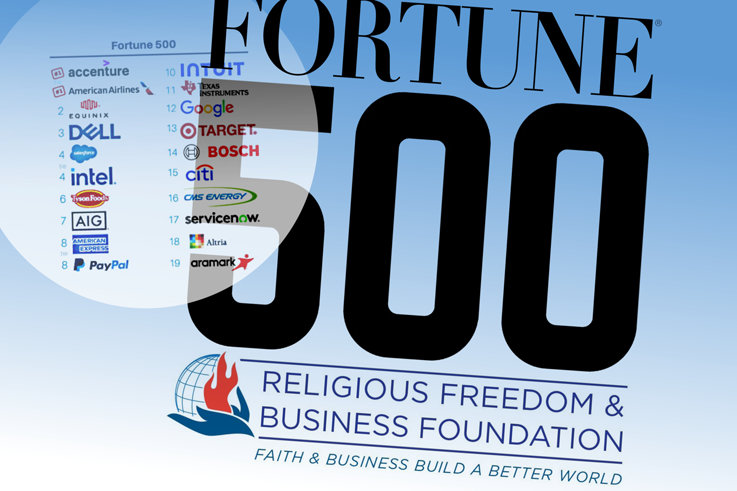
-
HOME
-
WHAT IS STANDOur Mission Our Values Our Help Contact
-
WHAT WE FIGHT FORReligious Freedom Religious Literacy Equality & Human Rights Inclusion & Respect Free Speech Responsible Journalism Corporate Accountability
-
RESOURCESExpert Studies Landmark Decisions White Papers FAQs David Miscavige Religious Freedom Resource Center Freedom of Religion & Human Rights Topic Index Priest-Penitent Privilege Islamophobia
-
HATE MONITORBiased Media Propagandists Hatemongers False Experts Hate Monitor Blog
-
NEWSROOMNews Media Watch Videos Blog
-
TAKE ACTIONCombat Hate & Discrimination Champion Freedom of Religion Demand Accountability
A Whopping Majority of Fortune 500 Companies Now Embrace Religious Diversity
Over 85%—429 companies of the Fortune 500—now embrace religion as a central factor in their commitment to diversity. The figure, tabulated by the 2024 Corporate Religious Equity, Diversity & Inclusion (REDI) Index and Monitor in a May 20 report, represents a more than 100% increase from 2022.

Described as a “tipping point” by Religious Freedom & Business Foundation President Dr. Brian Grim, the number includes 62 companies—12.4%—that now also feature faith-based employee resource groups (ERGs). These ERGs, which provide a platform for employees to express their faith and contribute to a more inclusive work environment, are a testament to the growing recognition of religion in the workplace.
“Our team members, across all faiths and beliefs, help us better understand and serve our customers around the world.”
The corporate world’s skyrocketing awareness of the importance of religious inclusion to company health is gratifying but not entirely new news to Grim, who prophetically observed two years ago that “there’s been a massive change… in some of the world’s biggest and best companies towards embracing religion as part of their overall diversity, equity and inclusion initiatives.”
The REDI survey ranked companies in 11 categories, including their religious accommodations, chaplain services, and protocols for reporting inequity and bias. Accenture and American Airlines sat atop the pack, tied as the most faith-friendly Fortune 500 companies, with perfect scores on the Index.
Cedric Rockamore, American Airlines’ vice president of global people operations, said, “Our purpose is to care for people on life’s journey, including our customers and our 130,000 team members. Our team members, across all faiths and beliefs, help us better understand and serve our customers around the world.”
Equinix, Dell Technologies, Intel Corporation, Salesforce and Tyson Foods also scored high on the REDI Index.
Nurturing religious diversity includes going out of one’s corporate way to accommodate faith-based dietary restrictions in company cafeterias and offer days off for Christian and non-Christian holy days. For some corporations, embracing diversity also includes education, like offering religious literacy training to foster greater understanding across faiths.
According to the REDI study, of the 32 top companies, 72% match employee donations to various religious charities, 87% provide chaplain services for staff, and 100% appropriately celebrate their employees’ holy days.
According to Grim, one of the many benefits of a company’s embrace of religious diversity is that businesses that would ordinarily be competitors are eager to exchange best practices on religious inclusion and will sometimes collaborate for special events.
For example, Grim cited how the Christian and Black ERGs at Intel and Microsoft joined forces to host a joint Martin Luther King Jr. Day celebration for both companies. Likewise, on May 22, Dell, together with Merck, CVS Health, The Nation’s Mosque, Catholic Charities and Helping Hands, sponsored a “Feed the Hungry” Multi-Faith Prayer and Service Project at Washington, D.C.’s The Catholic University of America.
Will the trend toward religious inclusivity and intercorporate collaboration promoting it continue? Grim thinks so. “I think that’s a very hopeful trend in these polarizing times,” he said.
Grim founded the Religious Freedom & Business Foundation (RFBF) in 2014, a nonpolitical, nonpartisan group unaffiliated with any faith. In the ensuing decade, RFBF has helped organizations incorporate religious diversity into their core corporate values. The group aims to demonstrate “that the economic value and social benefits of robust religious diversity and liberty for all are tremendous.”
STAND congratulates all companies who have gone the extra mile to make the corporate world a more inclusive world for members of every faith.






